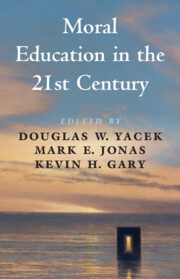Book contents
- Moral Education in the 21st Century
- Moral Education in the 21st Century
- Copyright page
- Contents
- Contributors
- Acknowledgments
- Chapter 1 Why Does Moral Education Matter in the 21st Century?
- Part I Historical Insights for Contemporary Moral Education
- Part II New Approaches to Moral Education
- Part III Responses to Contemporary Moral Problems
- Chapter 13 Moral Education in and for Virtual Spaces
- Chapter 14 The Consumerist Threat to Education and Democracy
- Chapter 15 Moral Education and Deep Disagreement
- Chapter 16 A Character-Based Perspective on Sexual Ethics and Sex Education
- Chapter 17 The Moral Eclipse of Boredom
- Index
- References
Chapter 13 - Moral Education in and for Virtual Spaces
from Part III - Responses to Contemporary Moral Problems
Published online by Cambridge University Press: 01 June 2023
- Moral Education in the 21st Century
- Moral Education in the 21st Century
- Copyright page
- Contents
- Contributors
- Acknowledgments
- Chapter 1 Why Does Moral Education Matter in the 21st Century?
- Part I Historical Insights for Contemporary Moral Education
- Part II New Approaches to Moral Education
- Part III Responses to Contemporary Moral Problems
- Chapter 13 Moral Education in and for Virtual Spaces
- Chapter 14 The Consumerist Threat to Education and Democracy
- Chapter 15 Moral Education and Deep Disagreement
- Chapter 16 A Character-Based Perspective on Sexual Ethics and Sex Education
- Chapter 17 The Moral Eclipse of Boredom
- Index
- References
Summary
This chapter describes and expands upon virtue ethical and virtue theoretical approaches to moral education in and for virtual spaces. Building on existing claims that virtual spaces call for new kinds of virtues, we argue that structural constraints make risks and vices especially hard to overcome in these contexts. We organize these constraints around a threefold approach to integrity, according to how they hinder knowledge, self-efficacy, and self-unity. We then turn to positive recommendations for removing these barriers. We outline implications for end users by exploring the need for the development of the “burdened virtues”, applying ideas from Lisa Tessman. We also consider what it would look like for this kind of moral development to be supported by educators, policy-makers, and other leaders within the tech ecosystem. We suggest that the way forward will be to educate for and build spaces in which the online and offline worlds are drawn into closer alignment, supporting integrity in all its forms.
- Type
- Chapter
- Information
- Moral Education in the 21st Century , pp. 231 - 259Publisher: Cambridge University PressPrint publication year: 2023
References
- 1
- Cited by

